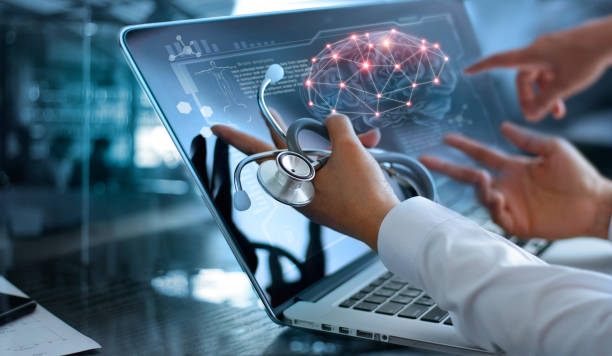The healthcare industry is in a constant state of evolution, and technology has played a vital role in catalyzing this change. One such technology that has been able to revolutionize the healthcare industry is Information and Communication Technology (ICT). In this blog, we will provide an overview of ICT in healthcare, its history and importance, its role and impact on modern healthcare, and the opportunities as well as challenges it presents.
We will also look at how ICT can improve medical data collection and analysis, facilitate patient-doctor communication, and streamline operations and management. Lastly, we will explore the risks associated with ICT such as data security concerns and literacy issues. So buckle up as we take you through a journey of ICT in healthcare.
Understanding ICT in Healthcare

The healthcare field has been transformed by ICT, encompassing digital technologies and communication tools. Its use has grown significantly in recent years, playing a vital role in the overall quality of care and health outcomes. Incorporating ICT tools in healthcare settings aligns with best practices, contributing to the systematic review and improvement of health services. The integration of artificial intelligence further enhances the ability of health care professionals to provide quality care and services.
Definition and Brief History of ICT in Healthcare
The incorporation of information and communication technologies (ICT) in healthcare has significantly transformed healthcare settings and patient care. Initially rooted in the utilization of electronic health records, ICT has laid a robust foundation for the digital revolution in healthcare. Its implementation has shown positive associations with improved quality of care and health outcomes, contributing to the overall advancement of public health.
Importance of ICT in Modern Healthcare
In modern healthcare, ICT has created educational opportunities for health professionals. It has enabled the use of electronic health records and health information technology, while enhancing data collection and analysis for healthcare providers. The World Health Organization recognizes the significance of ICT in healthcare, which has ultimately improved healthcare services and patient care.
The Role and Impact of ICT in Healthcare

Improving the quality of care and patient outcomes, Zorg ICT has streamlined healthcare operations through electronic health records. Information technology has enhanced patient care and accessibility, facilitating communication between healthcare providers and patients. Moreover, healthcare professionals have leveraged ICT for improved diagnostic and treatment options. The use of NLP terms such as ‘health services', ‘health professionals', and ‘health development' emphasizes the pivotal role of ICT in modern healthcare practices.
Enhancing Medical Data Collection and Analysis
In healthcare settings, ICT tools have revolutionized data collection and analysis. These tools enable big data analysis, utilize electronic medical records and mobile health apps, and create new opportunities for health information management. Through the use of information technology, healthcare organizations can enhance their data collection processes and derive valuable insights for improved patient care and public health interventions. Furthermore, mobile phones have also played a vital role in enabling data collection and supporting patient care within healthcare environments.
Facilitating Patient-Doctor Communication
Improved patient-doctor communication is one of the pivotal contributions of ICT in healthcare. Digital health platforms have transformed the way healthcare providers and patients interact, enhancing engagement and communication through mobile health apps. This transformation has significantly impacted patient care and health outcomes, allowing real-time communication between healthcare professionals and patients, thereby fostering a collaborative approach to healthcare delivery.
Streamlining Operations and Management
Enhancing healthcare operations and management, ICT tools have significantly boosted efficiency and effectiveness. The digital technologies have revolutionized healthcare service delivery, transforming the management of electronic health records. Healthcare organizations have efficiently allocated resources by leveraging ICT. These advancements have led to improved patient care, streamlined processes, and enhanced resource management, benefiting both health care professionals and patients.
Opportunities and Challenges of ICT in Healthcare

Expanding educational opportunities for health professionals and embracing new technologies in the healthcare sector, ICT presents improved prospects for both providers and patients. However, challenges related to the use of information technology persist, including issues with data security and literacy. Nevertheless, mobile phones and digital technologies have created new opportunities in healthcare, contributing to enhanced accessibility and improved diagnostic and treatment options.
Improved Diagnostic and Treatment Options
The integration of ICT in healthcare has broadened healthcare providers' access to medical apps and digital health tools, enhancing their diagnostic capabilities. Electronic health records have notably improved treatment options for patients. This integration has not only opened up new opportunities for both health providers and patients but has also created a range of new opportunities for healthcare professionals.
Enhanced Accessibility and Affordability of Healthcare Services
The use of information technology has significantly improved the accessibility and affordability of healthcare services. Through the utilization of ICT, healthcare services have expanded, providing greater reach to underserved populations. Mobile health apps and electronic health records have played a pivotal role in enhancing healthcare accessibility for patients and making services more affordable. Additionally, ICT tools have empowered healthcare providers to offer quality care to a larger audience, ultimately contributing to the advancement of public health.
Risks and Limitations: Data Security and Literacy
Data security risks are prevalent in healthcare due to the adoption of information communication technologies. Limited data literacy among healthcare professionals can impede the effective utilization of health information technology. Healthcare organizations encounter challenges in upholding data security amidst the integration of electronic health records. The healthcare sector has witnessed a substantial impact through the deployment of digital health technologies. Implementing measures to address data security and privacy concerns is imperative for information technology in healthcare.
Conclusion
In conclusion, ICT has revolutionized the healthcare industry by improving efficiency, accessibility, and patient care. With advanced medical data collection and analysis, doctors can make more accurate diagnoses and treatment plans. The use of ICT also facilitates seamless communication between patients and healthcare providers, ensuring timely and effective care. Furthermore, it streamlines operations and management, leading to cost savings and better resource allocation. While ICT presents numerous opportunities for improved healthcare, challenges such as data security and digital literacy must be addressed. Overall, embracing ICT in healthcare holds immense potential for transforming the industry and ultimately improving patient outcomes.





